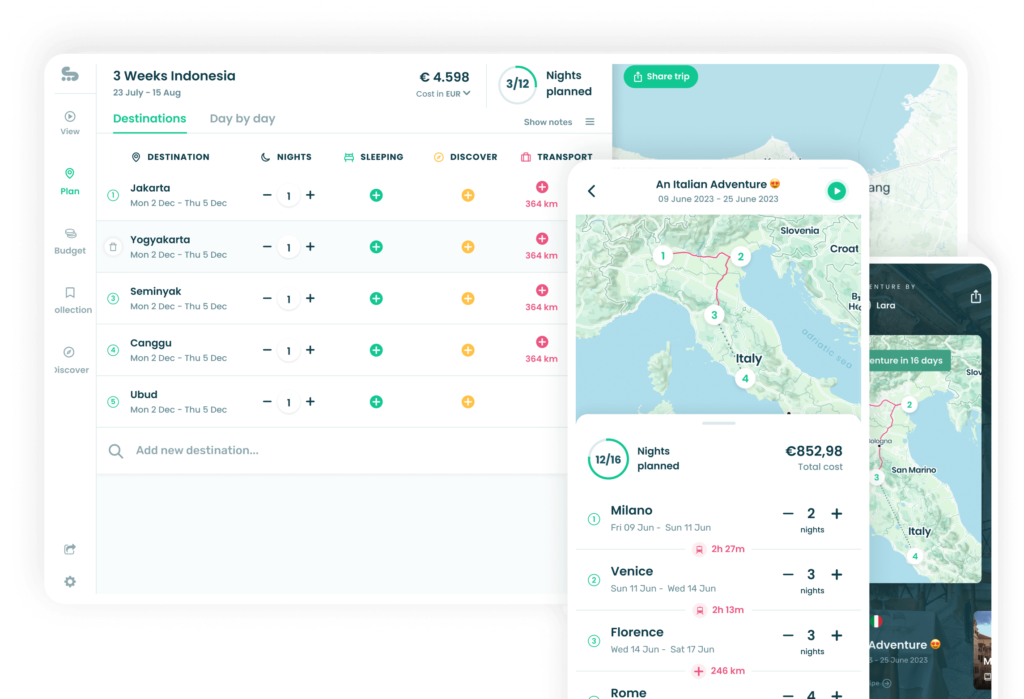Are you considering traveling solo to South Africa but worried about your safety? It’s natural to feel concerned, but with the right precautions, it can be a rewarding and unforgettable experience. In this blog, we will address all your doubts and queries about solo travel in South Africa.
We’ll talk about the necessary vaccinations, ideal travel time, cost of travel, and much more. We’ll also provide you with a 14-day itinerary that covers all the must-visit places for solo travelers.
Last updated on: 02-01-2024
Is it safe to travel alone in South Africa?

Solo travel in South Africa can be safe, but it’s important to be cautious and well-prepared. While some sources emphasize the need for vigilance due to the country’s high crime rate, others highlight the potential for a fantastic and safe experience with the right precautions.
South Africa holds the 130th spot on the Global Peace Index. The GPI is a creation of the Institute for Economics and Peace (IEP) and stands as the foremost global measure of worldwide tranquility.
Here are some key points to consider when traveling alone in South Africa:
- Be mindful of the environment, especially in crowded or unfamiliar places.
- Keep important travel documents, cash, and valuables secure; consider using a hidden pouch or money belt.
- Share your travel plans, including accommodation details, with someone you trust and check in regularly.
- Stay informed about travel advisories, follow local laws, and respect cultural norms and traditions.
- Trust your instincts and remove yourself from any situation that feels unsafe.
Best time to visit South Africa
The best time to visit South Africa is from May to September for wildlife viewing and safaris, while the period from November to March offers warm temperatures and vibrant festivals, but requires advance planning due to high demand and prices.
The best time to visit South Africa depends on various factors such as weather, wildlife viewing, and regional activities. Here’s a summary:
1. May to September: This period is generally considered the best time to visit South Africa, especially for wildlife viewing. The cooler winter months in the northern regions provide excellent conditions for observing big game, making it an ideal time for safaris.
2. November to March: This period is South Africa’s summertime, with warm temperatures and vibrant festivals. It’s a peak season for visitors, but accommodations in coastal areas and national parks can be booked out months in advance, and prices can rise significantly.
3. Regional Variations: The Cape has beautiful, hot, dry weather in its summer months (between November and February), with temperatures suitable for whale watching between July and November. The KwaZulu-Natal coast has year-round sunshine, making it a good destination at any time.
4. Considerations for Specific Activities: For those interested in whale watching, the best time is between June and November, with September usually having the highest numbers of whales.
Best Seasons for different activities
Summer in South Africa is perfect for beach visits, swimming, safari game drives, and outdoor festivals.
Autumn offers wine tasting, hiking, wildlife safaris, and cultural tours like the Cape Town Jazz Festival.
Winter is great for whale watching, shark cage diving, exploring national parks, and city sightseeing with fewer crowds.
In spring, you can enjoy wildflower viewing, road trips along the Garden Route, and outdoor adventures like hiking and mountain biking.
Socializing with other solo travelers
Meeting fellow solo travelers can greatly enhance your solo trip to South Africa. To find travel buddies, consider joining group activities such as city tours, wine tasting, or game drives.
Backpacker hostels often organize social events, game nights, and group outings, providing opportunities to meet other travelers.
Downloading a travel buddy app or engaging in online travel communities, forums, or social media groups can also help you find travel buddies or seek advice from experienced solo travelers.

Attending local events like food festivals, street markets, or cultural celebrations is another great way to meet people from different backgrounds.
Popular spots for meeting fellow travelers
Looking to meet fellow travelers during your solo trip to South Africa? Cape Town’s Kloof Street is known for its vibrant nightlife and trendy bars, providing ample opportunities to socialize.
For a convenient way to connect with other explorers, hop on the Baz Bus, a backpackers bus that allows you to meet people while traversing the major cities.
Wine enthusiasts can join the relaxed and sociable wine tram tour in Franschhoek.
And don’t forget the unforgettable experience of joining safari tours, especially in Kruger National Park, where you can bond with fellow adventurers on game drives and around campfires.
Must-try dishes in South Africa

When exploring South Africa, make sure to try the delicious street foods that are popular among locals and travelers alike. Here are five must-try dishes in South Africa:
1. Biltong & Droëwors: These are dried meats that are popular snacks in South Africa. Biltong is typically made from beef, while droëwors is a type of dried sausage.
2. Boerewors: This is a traditional South African sausage made from beef, mixed with either pork or lamb and a mixture of spices. It is often cooked on a braai (barbecue).
3. Cape Malay Curry: This curry is influenced by the Cape Malay community and is known for its aromatic and flavorful blend of spices. It often includes meat or fish and is served with rice.
4. Malva Pudding: This is a sweet and sticky sponge pudding of Cape Dutch origin, typically containing apricot jam and served with a creamy sauce. It is a popular dessert in South Africa.
5. Chakalaka & Pap: Chakalaka is a spicy vegetable relish, and pap is a type of porridge made from maize meal. This combination is a staple in South African cuisine, often served as a side dish.
These dishes showcase the diverse influences and flavors found in South African cuisine, making them a must-try for anyone looking to experience the country’s culinary delights.
How much does it cost to travel through South Africa for two weeks?
The cost of traveling through South Africa for two weeks can vary based on factors such as accommodation, transportation, activities, and dining. Here’s a breakdown of the estimated costs based:
1. Overall cost: The average cost for a trip for two people for two weeks in South Africa is approximately R46,291, which translates to about $3,200 USD.
2. Accommodation: The cost of accommodation can range from $150 to $400 per night for mid-range hotels or guesthouses, depending on the location and time of year. High-end properties can charge upwards of $1,000 per night.
3. Transportation: The rough cost of renting a car for two weeks in Johannesburg is around $230, while the cost of renting a car per day in Cape Town ranges from $22 to $70. Additionally, flights between cities can range from $117 to $230, and bus tickets from Cape Town to Durban can cost around $83 for a return trip.
4. Activities and Sightseeing: Entrance fees for popular attractions such as Cape Point Nature Reserve, Kirstenbosch National Botanical Gardens, and Table Mountain Cableway tickets can range from $13 to $24.
5. Daily Expenses: The daily expenses for two people can range from $73 to $149, covering food, travel, and sightseeing.
It’s important to consider the specific preferences and priorities of the travelers to create a more accurate budget for the trip.
14-Day itinerary for solo travelers in South Africa

Days 1-3: exploring Cape Town
During the first few days in Cape Town, make sure to ascend Table Mountain for stunning mountain views and breathtaking panoramic sights of the city and its surrounding natural landscapes. Explore the lively V&A Waterfront, where you can enjoy a plethora of shops, restaurants, and live entertainment.
Don’t miss the opportunity to visit Robben Island, a UNESCO World Heritage Site, to delve into South Africa’s history, including Nelson Mandela’s incarceration. Take a stroll through the vibrant streets of Bo-Kaap, famous for its Cape Malay culture and mouthwatering local cuisine.
For an unforgettable experience, hike up Lion’s Head and witness the captivating views of Cape Town, especially during sunrise or sunset.
Days 4-6: adventures in the Garden Route
During your solo trip in South Africa, make sure to include Days 4-6 for unforgettable adventures in the Garden Route. Start by stopping in Mossel Bay, known for its beautiful beaches and outdoor activities. Explore the stunning coast of Plettenberg Bay with its golden beaches and opportunities for whale watching.
Don’t miss Tsitsikamma National Park, home to lush forests and dramatic coastlines. Experience adrenaline-pumping activities like bungee jumping from Bloukrans Bridge or hiking along the Otter Trail.
Finally, indulge in wine tasting in Franschhoek, a picturesque town known for its vineyards and gourmet cuisine.

Tip (no advertisement): for planning your route, we can recommend using the Stippl app.
Days 7-9: safari experience in Kruger National Park
Embark on game drives, either self-driven or guided, to spot the iconic “Big Five” and other wildlife. Consider staying at private reserves for exclusive experiences. Join a night game drive to spot nocturnal animals.
Relax and soak in the wild beauty, enjoying nature’s sounds and breathtaking views. Enhance your safari with additional activities like bush walks, bird watching, or hot air balloon safaris.
Days 10-12: relishing the beaches of Durban
During days 10-12 of your solo trip in South Africa, take the opportunity to relish the beautiful beaches of Durban. Explore the vibrant atmosphere and partake in water sports along the Golden Mile, a stretch of beaches and promenade.
Visit uShaka Marine World, a popular aquarium and water park offering various exhibits and activities.
Don’t miss a leisurely walk through the Durban Botanic Gardens, the oldest surviving botanical garden in Africa.
Experience the local cuisine at the bustling Victoria Street Market, known for its spices, clothing, and food. Lastly, make sure to visit the impressive Moses Mabhida Stadium for panoramic city views from the top.
Days 13-14: unwinding in Johannesburg
Explore the lively neighborhoods of Johannesburg, such as Maboneng and Melville, to get a taste of the city’s vibrant culture. Immerse yourself in South Africa’s history by visiting the renowned Apartheid Museum, where you can learn about the country’s struggle for equality.
Take a day trip to the Cradle of Humankind, a UNESCO World Heritage Site, to marvel at ancient fossils and archaeological sites. Indulge in the local cuisine at bustling markets or restaurants like the Neighbourgoods Market or Soweto’s Wandie’s Place.
For a pampering experience, unwind at luxurious spas like the Four Seasons Hotel Spa or the Saxon Spa and Studio.
Packing tips for solo travel in South Africa
When packing for your solo trip to South Africa, it’s important to pack light and bring versatile clothing options to accommodate the different weather conditions you may encounter.
Don’t forget to pack a daypack to carry your essentials during day trips and excursions.
It’s also a good idea to bring a travel adapter for charging your electronic devices. Consider bringing a reusable water bottle to minimize plastic waste.
South Africa’s climate can vary greatly depending on the region and time of year. During the warmer months, it is advised to pack lightweight and breathable clothing to stay comfortable in the heat.
In cooler months, it is essential to bring warmer layers to stay cozy. When visiting cultural or religious sites, it is important to dress modestly and respectfully.
Don’t forget to include sun protection items like hats, sunglasses, and sunscreen. It’s also a good idea to pack a raincoat or umbrella for unexpected showers.
How to get around in South Africa?
Renting a car is a convenient way to explore South Africa, with a wide availability of rental cars. Public transportation options such as buses, trains, and taxis are also readily accessible.
Ride-hailing apps like Uber operate in major cities, providing an easy and reliable mode of transportation.
You have several local transport options to choose from. Public transportation, such as buses, trains, and taxis, is readily available in many areas.
For the environmentally conscious, some cities offer bike-sharing programs or have bike-friendly infrastructure. Exploring on foot allows for a more immersive experience, though safety should be considered in certain areas.
Conclusion
In conclusion, traveling solo in South Africa can be a rewarding and enriching experience. With proper safety precautions and awareness, you can explore the diverse landscapes, indulge in delicious cuisine, and interact with friendly locals.
Make sure to research and get necessary vaccinations before your trip. Plan your itinerary to include popular destinations like Cape Town, the Garden Route, Kruger National Park, Durban, and Johannesburg.
Embrace the warmth and hospitality of locals and immerse yourself in the stunning wildlife and landscapes.
Pepijn is the founder of Likeplan. He mainly writes about solo traveling. With over 10 completed solo trips, he writes from his own experience with the mission to encourage other people to go out and explore by themselves.

